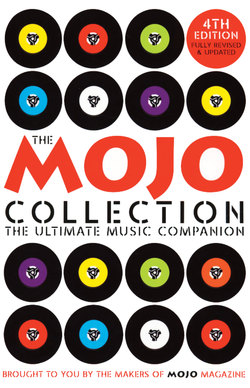Читать книгу The Mojo Collection - Various Mojo Magazine - Страница 66
На сайте Литреса книга снята с продажи.
The Beatles Revolver The next great leap forwards for the Fab Four.
ОглавлениеRecord label: Parlophone
Produced: George Martin
Recorded: EMI Studios, Abbey Road, London; April 6–June 21, 1966
Released: August 5, 1966 (UK) August 8, 1966 (US)
Chart peaks: 1 (UK) 1 (US)
Personnel: John Lennon (rg, o, v); Paul McCartney (b, ag, v); George Harrison (g, v); Ringo Starr (d, v); Geoff Emerick (e); John Gilbert, Sidney Sax, John Sharpe, Jurgen Hesse (vn on Eleanor Rigby); Stephen Shingles, John Underwood (va); Derek Simpson, Norman Jones (c); Amil Bhagwa (tabla on Love You To); Anyana Deva Angadi (sitar); Eddie Thornton, Ian Hamer, Les Condon (t on Got To Get You Into My Life); Alan Branscombe, Peter Coe (ts); Brian Jones, Marianne Faithfull, Patti Harrison, Mal Evans, Neil Aspinall, Terry Condon, John Skinner (v on Yellow Submarine)
Track listing: Taxman; Eleanor Rigby (S); I’m Only Sleeping; Love You To; Here, There And Everywhere; Yellow Submarine (S); She Said She Said; Good Day Sunshine; And Your Bird Can Sing; For No One; Dr Robert; I Want To Tell You; Got To Get You Into My Life; Tomorrow Never Knows
Running time: 34.59
Current CD: Parlophone CDP 7 46441 2
Further reading: Revolution In The Head (Ian McDonald, 1995); The Beatles As Musicians (Walter Everett, 1999); The Beatles: An Illustrated Record (Roy Carr and Tony Tyler, 1975); www.beatles.com
Download: Not currently legally available
The progression from the zesty ‘yeah, yeah, yeah’ of She Loves You to the mesmeric, acid-spiked Tomorrow Never Knows took four Liverpool kids just 33 months. Drugs, Eastern mysticism and fraternisation with their freakier peers (Dylan, Stones, Byrds, Brian Wilson) have traditionally been seen as the reason; yet one shouldn’t underestimate the disorientating effects of a pop megastardom without precedent and the heady blend of fear and creative power that comes with it. Rubber Soul had been reasonably straightforward but, suddenly, instead of bashing down tightly-written songs within a few takes, The Beatles fancied new working methods. For the first session of their 1966 album, they oversaw a mad evening where engineers wrestled with six mono tape machines simultaneously, running unwieldy loops of sound effects. Thus Lennon’s ‘recite the Tibetan Book Of The Dead on LSD’ opus, The Void, took shape.
This was 20-year-old, newly promoted engineer Geoff Emerick’s first session with The Beatles. ‘The group encouraged us to break the rules,’ he recalls. ‘[They told me] that every instrument should sound unlike itself: a piano shouldn’t sound like a piano, a guitar shouldn’t sound like a guitar, hence putting things through a Leslie speaker, and so on. When we were doing the horns on Got To Get You Into My Life we tried putting the mikes right into the bells of the trombones – treating mikes like camera lenses, in a way – and that hadn’t been done before. I started moving the mike closer to the bass drum too. I was reprimanded for that, because, according to the technical staff [at Abbey Road], the air pressure from the drum would destroy the mikes! I got a special letter saying I could do it, but only on Beatles sessions.’
John encouraged radical treatments on his voice. Paul experimented with his new Brennel tape recorder, George began mastering the sitar (and was awarded his first opening album cut with the punchy Taxman) and, on Tomorrow Never Knows (as The Void was renamed), Ringo’s kit was split between two channels and fed into a limiter to achieve the famous ‘backward’ rush that propels the track. Every song came complete with some curious sonic innovation.
‘I know for a fact that, from the day Revolver came out, it changed the way everyone else made records,’ says Emerick.
‘It was a good point for us,’ agrees Paul McCartney. ‘It depends what you want from an album, but if you really look at it bluntly, most people just want good songs. There’s a lot of good songs on Revolver. In fact, they’re all good.’
